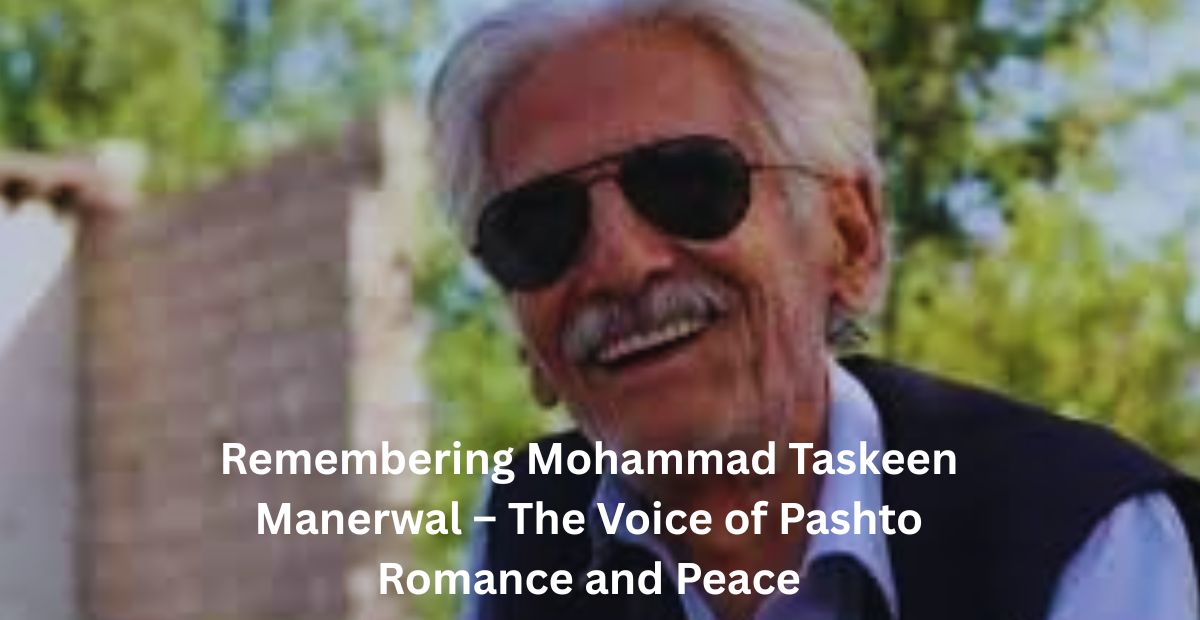Mohammad Taskeen Manerwal (Pashto: محمد تسکین مانیروال), born on 15 September 1949, was a revered name in Pashto literature. A poet, author, intellectual, and educator, he dedicated his life to nurturing both the spirit of knowledge and the soul of poetry. His legacy continues to resonate among Pashtuns in Pakistan, Afghanistan, and beyond.
Early Life: Roots in Swabi, Seeds of Passion
Taskeen Manerwal was born in Maniri, a picturesque village in the Swabi District of Khyber Pakhtunkhwa, Pakistan. His family was closely tied to education—his father, Mohammad Yameen, was a respected school headmaster. Taskeen had six siblings and was deeply influenced by the environment of learning at home.
Interestingly, the name “Taskeen” originally belonged to an elder brother who passed away, and “Manerwal” was a nickname derived from his village. These names, steeped in emotion and identity, would go on to symbolize his unique poetic voice.
He began his educational journey in 1953 and matriculated from Swabi High School in 1965. He completed his intermediate education in 1967 at the Government Post Graduate College, Swabi, and later earned a private B.A. in 1977 and a B.Ed in 1980.
A Lifelong Educator
Taskeen became a schoolteacher in 1969, embracing education not just as a profession but as a passion. He served diligently and retired in 1999 as a headmaster. His students remember him not only as a teacher of academics but also as a mentor who instilled values of compassion, peace, and literary appreciation.
Literary Journey: Poetry of the Soul
Taskeen Manerwal’s journey into poetry began as early as fifth grade, inspired by the classical Pashto poets Rahman Baba and Khushal Khan Khattak. His literary talents flourished during his college years when he contributed to the college magazine Neelab. His work soon captured the attention of senior literary figures, including the legendary Abdul Ghani Khan.
Manerwal’s poetry, especially his ghazals, struck a chord with Pashtuns across borders. His style was deeply romantic yet filled with spiritual and Sufi undertones. Among his most beloved works is the poem “Cha Kha Khoshay Shara Wy” (1973). This title was later used for his only published poetry collection, released in 2011, which further cemented his reputation as a romantic poet of peace.
His poetry remains widely read and quoted, particularly among lovers of classical Pashto literature and contemporary fans of lyrical verse.
A Quiet Life, A Loud Legacy
Despite his popularity, Taskeen Manerwal never married, choosing instead to devote his life to writing and education. Friends and colleagues described him as a peace-loving soul, deeply influenced by Sufi philosophy and aloof from political affairs.
He believed in the power of words to bring solace, often saying that he would live among the people through his poetry. His life, though filled with personal struggles, was a testament to quiet resilience and unwavering dedication to culture and literature.
Passing and Legacy
On 10 January 2022, Mohammad Taskeen Manerwal passed away in Swabi and was laid to rest in his ancestral graveyard in Maniri Payan. His death was mourned across the Pashtun belt, with political and cultural leaders expressing heartfelt condolences. Among them were Qaumi Watan Party’s Sikandar Hayat Khan Sherpao, ANP’s Aimal Wali Khan, and Sardar Hussain Babak.
Final Thoughts: The Echo of a Poet’s Heart
Taskeen Manerwal’s poetry continues to serve as a mirror for love, peace, and introspection. While he may no longer walk among us, his verses keep his spirit alive, inspiring new generations of Pashto readers and writers.
In an era where voices are often lost in noise, Manerwal’s soft, poetic whisper continues to echo—a reminder that beauty, wisdom, and peace still have a place in the world.
Tags:
Mohammad Taskeen Manerwal, Pashto Poet, Swabi Poet, Romantic Pashto Poetry, Pashto Literature, Taskeen Poetry, Pakistani Poets, Pashto Ghazals, Sufi Poetry
